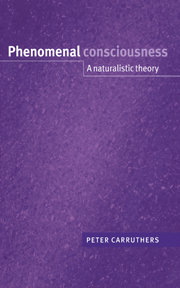Book contents
- Frontmatter
- Contents
- List of figures
- Preface
- 1 Assumptions, distinctions, and a map
- 2 Perspectival, subjective, and worldly facts
- 3 Explanatory gaps and qualia
- 4 Naturalisation and narrow content
- 5 First-order representationalism
- 6 Against first-order representationalism
- 7 Higher-order representationalism: a first defence
- 8 Dispositionalist higher-order thought theory (1): function
- 9 Dispositionalist higher-order thought theory (2): feel
- 10 Phenomenal consciousness and language
- 11 Fragmentary consciousness and the Cartesian theatre
- Conclusion
- References
- Author index
- Subject index
Preface
Published online by Cambridge University Press: 30 September 2009
- Frontmatter
- Contents
- List of figures
- Preface
- 1 Assumptions, distinctions, and a map
- 2 Perspectival, subjective, and worldly facts
- 3 Explanatory gaps and qualia
- 4 Naturalisation and narrow content
- 5 First-order representationalism
- 6 Against first-order representationalism
- 7 Higher-order representationalism: a first defence
- 8 Dispositionalist higher-order thought theory (1): function
- 9 Dispositionalist higher-order thought theory (2): feel
- 10 Phenomenal consciousness and language
- 11 Fragmentary consciousness and the Cartesian theatre
- Conclusion
- References
- Author index
- Subject index
Summary
Most contemporary philosophers of mind think that mental states are physical states of the brain, characterised in terms of their causal roles; and many hope that our common-sense conception of the mind can be incorporated smoothly into science. These are beliefs and hopes which I share. But philosophers such as Thomas Nagel (1986) and Colin McGinn (1991) have argued that consciousness – particularly phenomenal consciousness, or the sort of consciousness which is involved when one undergoes states with a distinctive subjective phenomenology, or ‘feel’ – is inherently, and perhaps irredeemably, mysterious. And many would at least agree with Roger Penrose (1994) and David Chalmers (1996) in characterising consciousness as the ‘hard problem’, which (like the question of the origin of the universe) forms one of the few remaining ‘final frontiers’ for science to conquer. Yet there have also been a plethora of attempts by philosophers and psychologists at explaining consciousness in natural terms. These debates have attracted a great deal of interest, both throughout the academic community and amongst the wider public.
This book reviews and contributes to these debates, with the overall objective of defending a particular kind of naturalistic (scientifically acceptable) explanation of phenomenal consciousness – namely, dispositionalist higher-order thought theory. My view is that phenomenal consciousness consists in a certain sort of intentional content (‘analog’, or fine-grained), held in a special-purpose short-term memory store in such a way as to be available to higher-order thoughts about the occurrence and nature of those contents; and that in virtue of such availability (given the truth of some or other form of ‘consumer semantics’) all of those contents are at the same time higher-order ones, acquiring a dimension of seeming or subjectivity.
- Type
- Chapter
- Information
- Phenomenal ConsciousnessA Naturalistic Theory, pp. xiii - xxPublisher: Cambridge University PressPrint publication year: 2000



